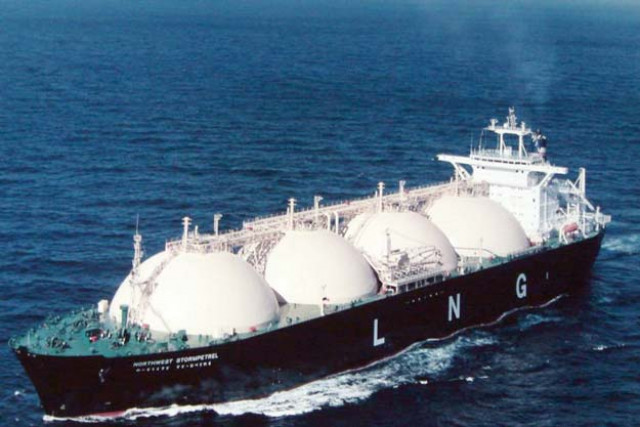LNG import, distribution: Govt mulling over setting up special purpose vehicles
CNG filling stations will be invited to participate in SPVs.

ECC) has already approved a transaction model for the CNG sector, which is allowed to import and re-gasify LNG under arrangements with private players. PHOTO: AFP
“A number of special purpose vehicles (subsidiary companies) may be set up under a corporate structure where compressed natural gas (CNG) stations will also be invited to participate,” an official said while talking to The Express Tribune. These SPVs will import LNG and distribute re-gasified LNG.
According to officials familiar with the developments, besides the import of LNG by government-designated Pakistan State Oil (PSO), the private sector is also engaged in LNG purchase from overseas markets.
The Economic Coordination Committee (ECC) has already approved a transaction model for the CNG sector, which is allowed to import and re-gasify LNG under arrangements with private players.
Officials said in addition to the CNG filling stations, the fertiliser plants linked to the Sui Northern Gas Pipelines Limited’s (SNGPL) network had also expressed firm interest in importing LNG on the similar structure as suggested for the CNG sector.
LNG imported by either party should be transported through the existing gas supply network, they said.
At present, two gas utilities – SNGPL and Sui Southern Gas Company (SSGC) – are engaged in the transmission and distribution of natural gas in the country. After its availability, the re-gasified LNG will be transmitted from the SSGC pipeline network to the SNGPL system under swap arrangements to meet the demand from consumers, including power producers.
Current capacity of the transmission system is limited to 325 million cubic feet of gas per day (mmcfd). This capacity has been allocated to the independent power producers (IPPs) from March and will be enhanced to 400 mmcfd by November.
Now, the Ministry of Petroleum and Natural Resources asks the government to allow the Oil and Gas Regulatory Authority (Ogra) to grant permission for third-party capacity allocation and set transportation tariff under negotiated arrangements between the parties. It also suggests that third-party access rules may be held in abeyance until the required amendments are made.
Gas utilities had highlighted various bottlenecks in the third-party access rules, which were likely to hamper a smooth transportation of imported LNG through the existing system. The capacity allocation in the existing network for the third party was to be decided under these rules.
The role of utilities is limited to the transmission of LNG to the consumers and they will be entitled to transportation charges under a pre-determined formula.
Furthermore, the utilities said they were obliged to account for gas in terms of equivalent energy irrespective of the volume injected at the entry point. The excess volume supplied to meet the requirement of British thermal units will likely be considered unaccounted for gas (UFG), causing severe losses to SNGPL and SSGC. Under the circumstances, various sections in the rules require an extensive review.
Published in The Express Tribune, March 31st, 2015.
Like Business on Facebook, follow @TribuneBiz on Twitter to stay informed and join in the conversation.


















COMMENTS
Comments are moderated and generally will be posted if they are on-topic and not abusive.
For more information, please see our Comments FAQ